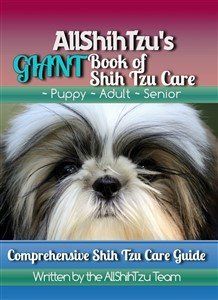Shih Tzu Skin Problems
Overview
The Shih Tzu breed is prone to a variety of skin issues. These can range from common, relatively minor concerns to more serious conditions that require prompt attention. Understanding these skin problems is crucial for any Shih Tzu pet parents, as early detection can help in managing the issue effectively.
Here we will cover the details of both common but manageable skin conditions you can often treat at home and more serious skin conditions that often require veterinary care.
Please note: AllShihTzu is reader-supported, and some of the product suggestions on this page are affiliate links. As an Amazon Associate we earn from qualifying purchases. This is at no extra cost to you and helps keep this site running.
Common but Manageable Skin Conditions in the Shih Tzu Breed
Below is a closer look at some of the most frequent skin issues Shih Tzus face, along with signs and symptoms:
Itching Skin: This is a common symptom with the Shih Tzu breed and can stem from various causes. The itchiness often leads to behaviors like excessive scratching, licking, or biting at the skin. It's important to note the areas where the itching occurs, as this can be a clue to the underlying cause.
Rash: Skin rashes typically appear as areas of redness, bumps, or irritation. These rashes can occur anywhere on the body but are often found in areas with less fur. They might cause discomfort or itching, leading the dog to scratch or lick the affected area.
Hot Spots: Also known as acute moist dermatitis, hot spots are areas of inflamed, infected skin that appear red and moist. These areas can be very itchy and painful. A Shih Tzu with hot spots may excessively lick or chew at the affected area, potentially leading to further irritation or infection.
Dog dandruff, or seborrhea: This causes flaky skin and itchiness in dogs. It can be hereditary (primary) or caused by factors like allergies or diet (secondary), and is managed with specialized shampoos and proper grooming.
Treatment for Itching (with or without dry skin), General Rash and General Hot Spots
There are several steps you can take to help your Shih Tzu with skin problems, both by making changes to their environment and care and by applying topical treatments:
#1 Moisturize the Air: Use humidifiers to combat dry air, especially during winter or in dry climates, which can exacerbate skin issues. Place humidifiers where the dog spends most of its time. Pure Enrichment's Ultrasonic Cool Mist Humidifier is a good option, with features like a 25-hour run time, quiet operation, and a night-light. Other methods include leaving the bathroom door open when showering, having houseplants, and placing containers of water near heating elements.
#2 Soothing Baths with Specialty Shampoo: A specialty shampoo can help quite a bit. For example,
Earthbath Oatmeal & Aloe Shampoo works very well to treat itchy skin due to its combination of coconut cleansers, colloidal oatmeal and organic aloe vera. And if a Shih Tzu has very irritated hot spots, the
EarthBath Tea Tree Oil & Aloe Vera Shampoo works well with its soothing formula.
When using soothing and conditioning shampoos that combat dryness and itching, you can increase bathing frequency to once per week until the skin condition improves, then reduce back to once every three weeks. Use a very gentle touch and allow the product to soak in for at least 5 minutes before rinsing off with room temperature water.
#3 Direct Skin Treatment with Sprays: Specialty sprays and spritzes can be very effective tools to treat skin issues since you can directly spray the spots that are most bothersome to your Shih Tzu. The right products can provide immediate relief. For minor to moderate skin conditions like itching, hot spots, and irritation, you may wish to try TropiClean Hypoallergenic Itch Relief Spray which contains colloidal oatmeal and Vitamin E.
For more severe cases, where the skin is extremely itchy or hot spots are very sensitive and painful, consider using a medicated spray. Veterinary Formula's Clinical Care Hot Spot & Itch Relief Medicated Spray is an excellent choice. This contains lidocaine to numb pain, hydrocortisone to reduce itching, and allantoin to moisturize the skin. Apply this spray twice a day for consistent relief, targeting the specific problem areas.
#4 Dietary Changes: Food allergies or intolerances can result in skin problems, sometimes accompanied by gastrointestinal issues. Allergic reactions can occur due to food additives, commonly found in commercial dog foods. These can include artificial colors, flavors, and chemical preservatives, which are significant triggers for skin issues. Additionally, foods high in grains or soy, and even certain proteins like chicken, can cause adverse reactions.
Consider switching to All-Natural Food free from artificial coloring, flavoring, chemical preservatives (look for natural preservatives like tocopherols or ascorbates), soy, corn, grains, and by-products. A high-quality choice is Wellness CORE Natural Grain-Free for Small Breeds - Turkey & Chicken, which meets all these criteria and is made in the USA.
# 5 Offer a daily omega-3 supplement. Provide a daily omega-3 supplement to maintain skin and coat health, boost the immune system, and support joint health - important for certain breeds. Liquid fish oil, like Zesty Paw's Wild Alaskan Salmon Oil, is recommended for its ease of adding to meals and palatability for dogs. This specific product comes with a convenient pump; administer 1/2 to 1 pump based on your dog's weight.
#6 Address Environmental or Contact Allergies: To manage environmental or contact allergies in dogs:
Step 1: Identify Allergy Triggers
- Collaborate with your veterinarian to identify triggers, using ELISA blood tests or intradermal skin testing (though do note that these are not 100% reliable and only test for certain allergens).
- Prescribed medications like topical steroids for itchy skin and antihistamines for respiratory symptoms can be beneficial.
Step 2: Home Environment Adjustments
- Regular Cleaning: Wet dust your home weekly.
- Vacuuming: Use a HEPA-certified vacuum cleaner.
- Air Filtration: For homes with central air, use HEPA filters with an FPR rating of 10. Without central air, consider free-standing air purifiers with certified HEPA filters.
- Washing Fabrics: Use hypo-allergenic detergent for bedding, your dog's bed cover, rugs, pillowcases, and washable toys.
- Shoe Policy: Implement a rule for removing shoes upon entering the house.
- Grooming After Outdoors: Wipe your Shih Tzu down with grooming wipes and wash their paws after outdoor activities.
- Adjust Outdoor Activities: On high pollen days, limit walks to late afternoon or early evening, checking local pollen forecasts for guidance.
Details and Treatment of Dandruff
Overview: Less common but still possible is dandruff, which manifests as white flakes. The flakes are pieces of of dead skin cells that fall off. There are two main types of dandruff with canines: dry (aka seborrheic sicca) and oily (seborrhea). The oily type of dandruff on Shih Tzu dogs tends to be the type that has a bad odor, and this is due to the overabundance of body oil. Some Shih Tzu will have both types at the same time.
Very similar to dry skin, dandruff with Shih Tzu puppies and dogs can originate from dry arid air (especially in the winter), skin bacterial or fungal infections, allergies, certain diseases including Cushing's Disease or hypothyroidism, or an unbalanced diet lacking in omega-3s. In many cases, the cause of dandruff may remain elusive; if so, it is referred to as idiopathic seborrhea.
Other signs seen alongside dandruff include itching, skin odor, red irritated skin and/or excessive self-licking or chewing due to the itch.
What to do: Some cases of dandruff can be treated at home with:
- Supplements containing omega-3 fatty acids
(like fish oil) as mentioned earlier under 'Treatments for Itching'
- Shampoos or sprays specifically formulated for anti-seborrheic treatment. One that we recommend is Douxo Shampoo for Seborrhea in Dogs which works by normalizing sebum production while hydrating the skin. This is pH balanced, hypoallergenic and is sulfate and phthalate-free.
If there is no improvement after two weeks, dandruff should be treated by the veterinarian who can prescribe stronger treatments that may include corticosteroids, retinoid-based medications, oral cyclosporine such as Atopica, antibiotics for any secondary bacterial infections, and antifungals when yeast infections are present.
Note: There is a certain mite, named the Cheyletiella mite, that is so similar in appearance to dandruff flakes that their nickname is 'walking dandruff'; they are large enough to see by eye and if you look close, you will see them moving around. Treatment for this involves pyrethrin (insecticide) baths and should be both prescribed and overseen by the veterinarian.
Serious Skin Conditions in the Shih Tzu Breed
Shih Tzu dogs may be prone to certain serious skin conditions that can impact their health and well-being. Recognizing and understanding these issues is crucial for timely and effective care. Here's an overview of four significant skin problems in this breed:
Eczema: Eczema in Shih Tzus manifests as itchy, inflamed, and often scaly patches of skin. This condition can lead to discomfort and, if left untreated, secondary infections due to constant scratching.
Pyoderma: A bacterial skin infection, pyoderma causes sores, pustules, and crusty, flaky skin. It's often a result of an underlying issue like allergies, hormonal imbalances, or immune disorders.
Sebaceous Adenitis: This rare condition affects the sebaceous glands, leading to hair loss, scaly skin, and a musty odor. It's often mistaken for allergies or hormonal problems.
Skin Yeast Infections: Unlike the more common and mild yeast problems, severe infections can cause intense itching, redness, a distinct odor, and changes in skin texture, often in the ears, paws, and skin folds.
Please note: Each of these conditions presents unique challenges and symptoms, requiring a veterinarian's expertise for proper diagnosis and management. Ahead we cover the details.
Eczema in the Shih Tzu Breed: Symptoms, Treatments, and Prognosis
Eczema, a common dermatological condition, poses a significant concern in the Shih Tzu breed. This non-contagious skin disorder is characterized by inflammation, leading to discomfort and potential complications if left untreated. Understanding the symptoms, available treatments, and overall prognosis is crucial for Shih Tzu owners seeking to ensure the health and well-being of their pets.
Symptoms - Eczema in Shih Tzu dogs typically manifests through a variety of symptoms, which may vary in severity. The most common signs include:
- Skin Irritation and Redness: Affected areas often appear red and inflamed.
- Itchiness: The condition is usually accompanied by intense itching, leading to frequent scratching.
- Dry, Flaky Skin: Eczema can cause the skin to become dry and flaky.
- Hair Loss: Persistent scratching and irritation may result in hair loss in the affected areas.
- Lesions and Crusting: In severe cases, lesions and crusting can develop, further aggravating the condition.
At-Home Treatments - While veterinary consultation is recommended for a definitive diagnosis and treatment plan, certain at-home measures can help manage mild cases of eczema in Shih Tzu dogs:
- Regular Bathing: Use hypoallergenic or oatmeal-based shampoos to soothe the skin. Avoid over-bathing, as it can strip natural oils and worsen dryness.
- Moisturizing: After bathing, apply canine-specific moisturizers to keep the skin hydrated. One cream that we recommend is Warren London Hydrating Butter Cream for Dogs.
- Dietary Adjustments: Incorporate omega-3 fatty acids in their diet, which can improve skin health. Consider hypoallergenic diets if food allergies are suspected.
- Environmental Control: Minimize exposure to known allergens, such as pollen or dust mites, and maintain a clean, allergen-free living space.
- For details on these home remedies, see the previous 'Treatment for Itching, General Rash and General Hot Spots'.
Veterinary Treatments - Professional veterinary care is crucial, especially for severe or persistent cases of eczema. Treatment options include:
- Medicated Shampoos and Topicals: Vets may prescribe medicated shampoos or topical treatments to alleviate symptoms.
- Antihistamines or Steroids: These medications can reduce inflammation and itchiness.
- Immunomodulatory Therapies: In chronic cases, therapies to modify the immune response might be considered.
- Allergy Testing and Desensitization: If allergies are suspected, testing and subsequent desensitization treatments may be recommended.
Prognosis - The prognosis for Shih Tzu dogs with eczema is generally positive, especially with early detection and proper management. While eczema can be a chronic condition, most dogs lead comfortable lives with appropriate care. It's important to regularly monitor a Shih Tzu’s skin condition and promptly address any exacerbations.
Pyoderma in the Shih Tzu Breed: Symptoms, Treatments, and Prognosis
Pyoderma, a bacterial skin infection, is not uncommon in the Shih Tzu breed. This condition often results from and exacerbates pre-existing skin issues, such as allergies, hormonal imbalances or other issues linked to a Shih Tzu having sensitive skin. Recognizing the symptoms of pyoderma, understanding the available treatments, and being aware of the prognosis are essential for Shih Tzu owners to effectively manage this condition.
Symptoms - Pyoderma typically presents a range of symptoms in Shih Tzu dogs, which can vary based on the severity and depth of the infection:
- Pustules or Papules: These are small, raised bumps on the skin that may contain pus.
- Skin Redness and Irritation: The affected areas often appear inflamed and irritated.
- Itching: Pyoderma can be very itchy, leading to scratching and further skin trauma.
- Crusting and Scaling: As the condition progresses, crusty, flaky skin can develop around the lesions.
- Hair Loss: Affected areas may experience hair loss due to scratching and inflammation.
- Odor: A noticeable, often unpleasant, odor can accompany the infection.
At-Home Treatments - While veterinary intervention is crucial for treating pyoderma, certain at-home care can support the healing process:
- Gentle Cleaning: Regularly clean the affected area with a mild, antibacterial cleanser.
- Barrier Protection: Prevent the dog from licking or scratching the infected areas, using an Elizabethan collar if necessary.
- Balanced Diet: Ensure a nutritious diet to support the immune system.
Veterinary Treatments - Professional veterinary treatment is necessary to effectively treat pyoderma in Shih Tzu dogs:
- Antibiotics: Oral or topical antibiotics are commonly prescribed to fight the bacterial infection.
- Medicated Shampoos: Prescribed antibacterial and antiseptic shampoos can help in managing the infection and symptoms.
- Allergy Management: If the pyoderma is secondary to allergies, addressing the underlying allergies is crucial.
- Regular Follow-Up: Monitoring the response to treatment and adjusting as needed is important for full recovery.
Prognosis - The prognosis for Shih Tzu dogs with pyoderma is generally good with appropriate treatment. Most dogs respond well to antibiotics and recover without complications. However, recurrent pyoderma may indicate an underlying issue that needs to be addressed, such as allergies or hormonal imbalances.
Sebaceous Adenitis in the Shih Tzu Breed: Symptoms, Treatments, and Prognosis
Sebaceous adenitis, an uncommon but significant skin disorder, affects some Shih Tzu dogs. This condition involves inflammation of the sebaceous glands in the skin, leading to various symptoms and necessitating specific care. Unfortunately, it is chronic and incurable, but understanding the symptoms, treatment options, and prognosis is crucial to manage this condition effectively.
Symptoms - Sebaceous adenitis presents several distinctive symptoms in Shih Tzu dogs, including:
- Dry, Scaly Skin: The most common symptom, characterized by flakiness and scaling.
- Hair Loss: Affected areas may show thinning or complete loss of hair.
- Thickened Skin: The skin in the affected area can become thick and leathery.
- Odor: A noticeable smell can sometimes emanate from the affected skin.
- Secondary Infections: The damaged skin is susceptible to bacterial or yeast infections.
At-Home Treatments - Effective management of sebaceous adenitis at home involves:
- Regular Bathing: Use moisturizing or medicated shampoos to help hydrate the skin and remove scales. After proper diagnosis, and under guidance by the vet, baths are given using a keratolytic shampoo like Virbac Keratolux Shampoo , which softens the keratin of the skin, improving moisture content.
- Skin Moisturizers: Apply prescribed topical treatments or moisturizers to affected areas to maintain skin hydration.
- Nutritious Diet: Include omega-3 and omega-6 fatty acids in the diet to support skin health.
- Gentle Grooming: Regular, gentle grooming can help remove loose scales and hair, but avoid excessive brushing which can irritate the skin.
For details on bathing, moisturizing and diet, see the previous 'Treatments for Itching'.
Veterinary Treatments - Veterinary intervention is crucial for diagnosing and treating sebaceous adenitis:
- Diagnosis: A definitive diagnosis usually requires a skin biopsy.
- Immunosuppressive Drugs: In severe cases, drugs to suppress the immune response might be necessary.
- Antibiotics or Antifungal Medications: These are prescribed if secondary infections are present.
- Regular Monitoring: Ongoing veterinary care is important to assess the effectiveness of treatments and adjust as needed.
Prognosis - The prognosis for Shih Tzu dogs with sebaceous adenitis varies. While the condition is chronic and incurable, it can be managed effectively with proper treatment. Regular veterinary check-ups and consistent at-home care are key to maintaining the quality of life for a Shih Tzu with this condition.
Skin Yeast Infections in the Shih Tzu Breed: Symptoms, Treatments, and Prognosis
Skin yeast infections, often caused by the overgrowth of the yeast Malassezia pachydermatis, are a prevalent issue in the Shih Tzu breed. Malassezia yeast is normally present in small numbers on a dog's skin, living in balance with other microorganisms. However, under certain conditions, such as increased humidity, weakened immune systems, or skin allergies, this yeast can multiply excessively, leading to infections.
These infections can cause significant discomfort and irritation for affected dogs. Recognizing the symptoms, employing effective treatments, and understanding the overall prognosis is essential to manage this condition effectively.
Symptoms - The symptoms of skin yeast infections in Shih Tzu dogs can vary but typically include:
- Itchy Skin: One of the most noticeable signs, leading to constant scratching.
- Redness and Inflammation: Infected areas often appear red and swollen.
- Musty Odor: A distinct, unpleasant smell is frequently associated with yeast infections.
- Thickened Skin: Chronic infections may cause the skin to become thick and leathery.
- Discoloration: The affected skin may turn darker or have a different pigmentation.
- Hair Loss: Persistent scratching and skin damage can lead to hair loss.
At-Home Treatments - While veterinary guidance is paramount, several at-home treatments can support recovery:
- Antifungal Shampoos and Rinses: These can be obtained over-the-counter, but we highly recommend vet supervision since this can cause irritation if used when a yeast infection is not present or if there a different skin issue happening. So, it's best to get an official diagnosis. Once given the 'okay', a shampoo like Veterinary Formula Clinical Care Antiseptic and Antifungal Medicated Shampoo can work well.
- Regular Bathing: For a Shih Tzu prone to yeast, bathing every other or every third bath with an OTC anti-fungal shampoo can work well to prevent reoccurring issues.
- Dietary Adjustments: Some diets, especially those low in sugar and carbohydrates, can help reduce yeast growth.
- Good Hygiene: Keep the infected area clean and dry as moisture can exacerbate yeast growth.
Veterinary Treatments - Professional veterinary treatment is essential for effectively managing skin yeast infections:
- Diagnosis: Accurate diagnosis may require skin scrapings or cultures.
- Oral Antifungal Medications: In severe cases, oral antifungal medications may be prescribed.
- Topical Treatments: These may include medicated creams or ointments.
- Management of Underlying Conditions: Addressing any underlying issues, such as allergies or hormonal imbalances, is crucial for preventing recurrence.
- Prognosis - The prognosis for Shih Tzu dogs with skin yeast infections is generally good with appropriate treatment. Most dogs respond well to therapy and can recover completely. However, recurrence is possible, especially if underlying issues are not addressed.
Join the AllShihTzu family:
More Helpful Articles for You:
Genius Gadgets That Make Life with a Shih Tzu Easier - Clever tools, handy devices, and helpful doodads that can make daily routines easier and a whole lot more fun for both you and your little guy or gal.
Shih Tzu Dental Care - Oral health is at the top of concern for the Shih Tzu breed and all pet parents should be actively cleaning their Shih Tzu's teeth. See our top tips to keep your little guy or gal's teeth clean, to prevent infections and future tooth loss.
Top Treats for Shih Tzus with Sensitive Stomachs – If your Shih Tzu has a tummy that’s quick to protest, finding the right treat can feel like a guessing game. Thankfully, there are gentle options that dogs find super-delicious. See our list of the best belly-friendly treats
Shih Tzu Grooming - If you're looking to keep your Shih Tzu looking tidy and smelling good, this is the place to start. This provides a great summary of all grooming tasks with the Shih Tzu breed and will bring you to 'Grooming Tools', 'How to Give a Shih Tzu a Bath' and more.





